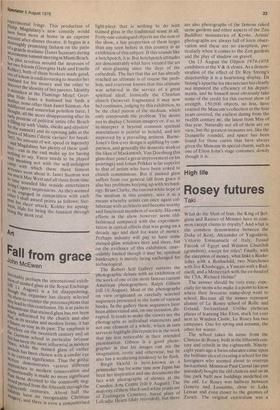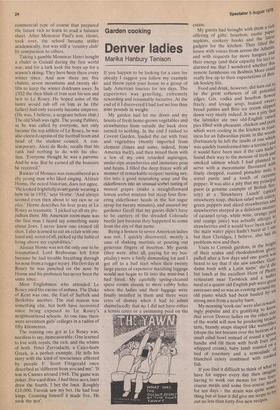High life
Rosey futures
Taki
What do the Shah of Iran, the King of Belgium and Rainier of Monaco have in common except claims to royalty? And what is the common denominator between the Duke of Kent, Alexander of Yugoslavia, Vittorio Emmanuele of Italy, Fouad Farouk of Egypt and Winston Churchill (grandson), except for titles? Finally, with the exception of money, what links a Rockefeller with a Rothschild, two Niarchoses with five Khashoggis, a Yamani with a Radziwill, and a Metternich with the ex-head of the CIA, Richard Helms? The answer should be very easy, especially for snobs who make it a point to know where their favourite name-drop went to school. Because all the names represent alumni of Le Rosey school of Rolle and Gstaad, Switzerland. Unlike plebeian places of learning like Eton, stuck for ever next to Windsor Castle, Le Rosey has two campuses. One for spring and autumn, the other for winter. The school takes its name from the Chateau de Rosey, built in the fifteenth century and rebuilt in the eighteenth. Ninetyeight years ago a Swiss educator came upon the brilliant idea of creating a school for the foreigners who seemed about to overrun Switzerland. Monsieur Paul Carnal (no pun intended) bought the old chateau and on its fine park built new buildings modelled on the old. Le Rosey was halfway between Geneva and Lausanne, close to Lake Leman and even closer to the gnomes of Zurich. The original curriculum was a
commercial type of course that prepared the future rich to learn to read a balance sheet. After Monsieur Paul's son, Henri, took over, the school became stiffer academically, but was still a 'country club' by comparison to others.
Taking a gamble Monsieur Henri bought a chalet in Gstaad during the first world war, and for a lark took the boys up for a season's skiing. They have been there every winter since. And now there are five chalets, seven mountains and twenty skilifts to keep the winter doldrums away. In 1932 the then Shah of Iran sent his son and heir to Le Rosey. He hoped some of the lustre would rub off on him as he (the father) had only recently become emperor. (He was, I believe, a sergeant before that.) The old Shah was right. The young Pahlavi, as he was called by everyone, not only became the top athlete of Le Rosey, he was also elected captain of the football team and head of the student council. A contemporary, Alexi de Rede, recalls that his rank had nothing to do with his election. 'Everyone thought he was a parvenu. And he was. But he earned all the honours he received.'
Rainier of Monaco was remembered as a shy young man who liked singing. Alistair Home, the noted historian, does not agree. 'He looked frightfully avantgarde wearing a bow tie in 1938,' says Home. 'And always seemed even then about to say rien ne va plus.' Home describes his four years at Le Rosey as traumatic. 'I picked up all my prejudices there. My American room-mate was the first man I heard say something nasty about Jews. I never knew one existed till then. I also learned to eat an eclair with one hand and, worst of all, picked up the habit of living above my capabilities.'
Alistair Home was not the only one to be traumatised. Lord Brabourne left Eton because he had trouble breathing through his nose from a rugger injury. His first day at Rosey he was punched on the nose by Horne and his proboscis has never been the same since.
Most Englishmen who attended Le Rosey used the excuse of asthma. The Duke of Kent was one, the Earl of Suffolk and Berkshire another. The real reason was something else, but both have recovered since being exposed to Le Rosey's neighbourhood schools. At one time there were seventeen girls' colleges in a radius of fifty kilometres.
The training one got at Le Rosey was, needless to say, immeasurable. One learned to live with royals, the rich, and the whims of both. Peter Zervudachi, a Cairo-born Greek, is a perfect example. He tells his story with the kind of insouciance affected by people F. Scott Fitzgerald once described as 'different from you and me'. 'It was in Cannes around 1948. The game was poker, five-card draw. I had three aces, later drew the fourth. I bet the limit. Roughly £10,000. Farouk saw my bet. He had four kings. Counting himself it made five. He took the pot'.































 Previous page
Previous page